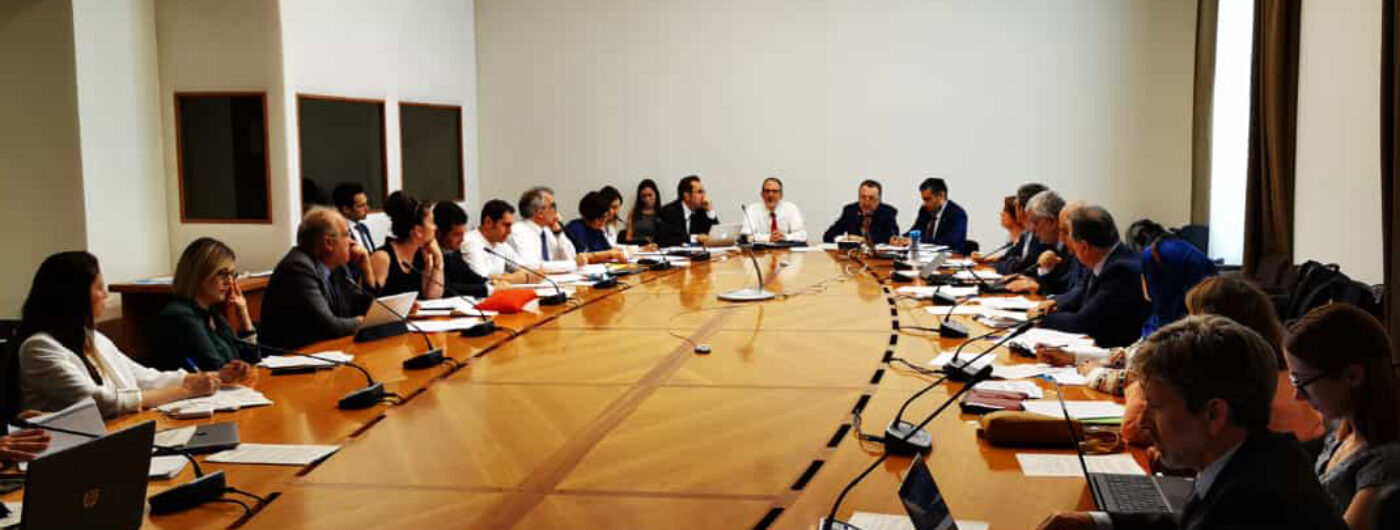
Achieving SDG6 and related SDGs in the Mediterranean Region: First Regional Policy Dialogue Workshop
26 June 2019, Rome. Hosted by the Ministry of Foreign Affairs of Italy, UfM, with the support of UNESCO-WWAP, gathered over 30 delegates from policy making level and WASH technical field on 26 June in Rome for the 1st Regional Policy Dialogue dedicated to its new project initiative Achieving SDG 6 and related SDGs in Mediterranean Region.
This new initiative builds on the UfM regional cooperation, information exchange and policy coherence being fundamental in the water sector and critical for the achievement of SDG 6 on water and sanitation as well as all related SDGs. While sharing similar water resource challenges and being exposed to emerging drivers and pressures such as climate change, increasing water scarcity, population dynamics and migration, the participating Member States at first agreed that due to the strong interdependencies of all SDGs, and particularly the strong linkages between SDG 6 and many other goals and targets, only concerted actions towards achieving SDG 6 will enable progress towards other goals of the 2030 Agenda.
This 1st Regional Policy Dialogue was seized by the participating Member States to uphold and reaffirm the importance of the UfM Water Policy Framework for Actions (UfM water Agenda) and its Financial Strategy, both of which were endorsed by the UfM Senior Officials’ Meeting on December 17, 2018. Through a number of panels, participating member states discussed the implementation of the UfM Water Agenda and especially on how the four thematic areas (i.e. water supply, sanitation and hygiene; water- employment-migration; water and climate change adaptation; and the water-food-energy- ecosystems nexus) could be better monitored and regional policy become better aligned.
The UNESCO World Water Assessment Programme (WWAP) that supports UfM in this project initiative offered delegates occasion to better understand Its evidence-based findings and concrete recommendations towards improved policy, decision-making and sustainable management of water issues and related fields.
After sharing its own experiences, findings and lessons learned through sessions dedicated to Voluntary National Reviews, Transboundary challenges and Monitoring gaps and cooperation opportunities, the delegates demonstrated within the working session that there is a strong political commitment in the Mediterranean region to address the current challenges through a coherent approach that will build on the regional synergies. Several groups analysed the ways this important initiative aims to improve regional capabilities to achieve SDG 6 through better monitoring, coherent priority setting and enhanced policies for sustainable integrated water resources management and the provision of water supply and sanitation services. The scope of the project being to improve and support coherency of regional sectoral policy by guiding and facilitating the sharing of knowledge and experiences between countries of the Mediterranean Region was then brainstormed in detail. The project outcomes were analysed through a range of its potential outcomes such as initial assessment of the current regional polices and available data related to the SDG 6 indicators, the status and effectiveness of monitoring and reporting mechanisms, knowledge gaps, relevant policy instruments and their application, overall institutional and technical capacity and knowledge tools and guidance to assist in assessing and monitoring progress, designing and implementing coherent policy, and building capacity. More specifically, the delegates appreciated for example proposed national information systems to be sustained by a non-exhaustive list of the knowledge tools that include guidelines on topics such as governance reforms, WASH policies’, mainstreaming gender and vulnerable groups, WASH analytical assessments, creation of national information mechanisms and sectoral policy plans.
Finally, this project initiative was widely welcomed as a potential mechanism for regional financing through a more coordinated infrastructure development, better investment preparation and promoted WASH gender sensitive entrepreneurships. Innovation in both, partnerships and technology, was yet again emphasized as one of the UfM top policy priorities leading towards better generation of respective practices and knowledge and its dissemination through the communities and countries within the Region.
While the delegates from UfM, UN agencies, International Organization, National Parliaments and Civil Societies had actively engaged in the dialogue and widely appreciated this occasion to jointly discuss the project initiative pillars of action, its 1st Regional Policy Dialogue served to all as the milestone of soon to be the principal UfM implementing mechanism for achieving SDG 6 and related SDGs in Mediterranean Region.
UfM Managing Director for Water, Almotaz Abadi, stated that “the initiative would be of assistance to enable new financing for achieving the SDG 6 and related SDGs in Mediterranean Region”. Turning to more technical aspects of it, Natalia Uribe Pando (UNESCO WWAP) offered some background information linking the regional policy to evidence based information mechanisms.
Enrico Granara, Senior UfM Official stressed the importance of moving forward within the UfM Water Agenda and invited delegates to share its best practices and jointly shape implementing outcomes under this important initiative.

